Despite being the #1 most common cause of hypothyroidism in developed countries, there are very few approved treatments for Hashimoto’s.
Why?
Because, as far as most doctors are concerned, it’s an autoimmune disease with an easy solution:
Prescription thyroid medication.
But there’s one problem:
While thyroid medication can definitely help you feel better by supporting thyroid function, it typically doesn’t do much for the thyroid gland destruction that occurs in Hashimoto’s.
On top of this, few people actually feel better when they take it.
For these reasons, it should come as no surprise that thyroid patients are looking, demanding even, new treatments for Hashimoto’s.
Today, we are going to explore new and emerging treatments for Hashimoto’s and see how they compare to what’s already available.
DOWNLOAD FREE RESOURCES
Foods to Avoid if you Have Thyroid Problems:
I’ve found that these 10 foods cause the most problems for thyroid patients. Learn which foods you should avoid if you have thyroid disease of any type.
The Complete List of Thyroid Lab tests:
The list includes optimal ranges, normal ranges, and the complete list of tests you need to diagnose and manage thyroid disease correctly!
Levothyroxine Alternatives
The gold standard for treating Hashimoto’ is levothyroxine.
This medication contains bioidentical T4 thyroid hormone, which is intended to replace thyroid hormone lost as the body destroys the thyroid gland.
Unfortunately, few patients do well taking it, with surveys showing that 19% of thyroid patients prefer it over other thyroid medications (1).
Fortunately, you have plenty of other options, including some better-designed T4-only and NDT medications that have been released within the last few years:
#1. New forms of T4
Medications in this class contain the same thyroid hormone as levothyroxine but differ in either how they are taken or their inactive ingredients.
These small changes are sufficient enough to improve how well they are absorbed and, therefore, their effectiveness.
Two of these come from the line of Tirosint medications.
Tirosint, which comes in a gel cap, and Tirosint-Sol, which comes as a liquid, contain the fewest inactive ingredients when compared to any other thyroid medication.
Making them cleaner than any other alternative.
Research has shown that, unlike levothyroxine, Tirosint can be taken 15-30 minutes before a meal without impacting the absorption or bioavailability of its contents (2).
Despite this, patient experience is mixed with about 50-60% seeing improvement when switching from levothyroxine to Tirosint alternatives.
Right now the biggest downside is the cost, but there are generics available as Levothyroxine Sodium Capsules USP.
On top of these, levothyroxine injections are also emerging as a potential option as they entered phase II clinical trials in 2023 (3).
Levothyroxine injections bypass the intestinal tract and allow for once-weekly dosing thereby improving both absorption and convenience for the patient.
They’re still undergoing dosing trials, but they may emerge as a viable option in the coming years.
#2. New forms of NDT (Adthyza)
On top of new T4-only medications, there’s also a new formulation available in the NDT family:
Adthyza contains a combination of T4 and T3 and was released within the last few years by Azurity Pharmaceuticals.
It claims to be lactose-free, corn-free, dye-free, and latex-free, providing another alternative to NP Thyroid and Armour Thyroid.
This is a welcome addition to the NDT family, given that both Nature-throid and WP Thyroid are still unavailable.
Research has consistently shown that patients with hypothyroidism prefer NDT medications over levothyroxine.
#3. Combination thyroid hormone replacement
Combination treatment combines multiple types of thyroid hormones to more closely replicate the thyroid hormone production of the thyroid gland.
This strategy has become more popular over the last year as T2 has gained notoriety.
As an active thyroid hormone, T2 supports metabolic function, enhances fat oxidation, improves T3 binding on the thyroid nuclear receptor, and may help with weight loss.
By combining T2 with T3 and T4, you can more closely mimic the thyroid hormone production of the healthy thyroid gland.
This strategy requires combining multiple medications together, but it works well for those who use it.
Off-Label Prescriptions
Instead of targeting the thyroid, these medications primarily impact the immune system, thereby attempting to prevent thyroid gland destruction.
Their use is considered off-label because they have not been officially approved to treat Hashimoto’s.
Even though they aren’t technically approved, they still have some data and research supporting their use.
#4. Metformin
Metformin is typically used to treat insulin resistance and diabetes, but it’s often used off-label for other conditions like weight loss and longevity.
We can also probably add Hashimoto’s to that list.
17 studies over the 15 years have shown that the use of metformin can impact TSH levels as well as thyroid antibodies (4).
Studies in mice have shown the same thing (5).
These studies are all small, though, so it’s difficult to draw any direct conclusions.
But given that metformin is so cheap, and that insulin resistance is often made worse by hypothyroid conditions like Hashimoto’s, it’s certainly worth a try for most patients.
#5. Low Dose Naltrexone
Originally created to treat alcohol dependence, naltrexone is often used off-label, in much smaller doses, for autoimmune conditions like Hashimoto’s.
When it’s used in this way, it’s referred to as low-dose naltrexone.
It’s really a backwater treatment, though, as it doesn’t have any large-scale studies showing that it’s effective specifically for Hashimoto’s.
There are, however, plenty of anecdotal reports both from patients and providers who say it is effective.
It’s currently thought that low doses have an immunomodulatory effect on the immune system, which can help reduce inflammation and help reduce thyroid antibodies.

Traditional dosing of naltrexone is 50 mg per day, but doses for Hashimoto’s are much smaller in the range of 1.5 to 4.5 mg per day.
Based on patient experience, roughly 50% of people who take it see some improvement in their symptoms, with another 50% experiencing no benefit at all.
Of that 50% who experience benefit, about 25% will see a moderate improvement, and another 25% a mild improvement.
Given that LDN has few side effects and is well tolerated, it’s worth a trial, especially if other treatments have failed to provide relief.
#6. Steroids
Steroids, like prednisone, are one of the most powerful immunosuppressants available, and they are commonly used to treat acute flare-ups in autoimmune conditions like lupus.
But due to their long list of undesirable side effects, they can only ever be used short-term in bursts of 14-21 days.
There really isn’t a place or need for steroids in Hashimoto’s with two exceptions:
- An acute flare-up of symptoms
- The presence of Hashimoto’s encephalopathy (6)
Given the side effects and the potential that steroids have to negatively impact thyroid hormone levels, they aren’t really a good option.
#7. Immunosuppressants & Immunomodulators
Immunosuppressants are sometimes floated as a potential treatment for Hashimoto’s, but they too suffer from the same issues as steroids.
Because the damage in Hashimoto’s is primarily localized to the thyroid, it often doesn’t make sense to suppress the immune system of the entire body just to benefit one tissue.
Doing so just sets you up for side effects like an increased risk of serious infections.
The current thought is that the risks of taking these medications outweigh the ease of just letting the immune system destroy the thyroid gland and then replacing that lost thyroid hormone with levothyroxine.
There’s limited evidence that these medications are beneficial for Hashimoto’s right now, so it’s best to avoid them.
Surgical Options
Surgical options are sometimes recommended for patients with various thyroid conditions.
These options include the complete removal of the thyroid gland (thyroidectomy) or partial removal of the thyroid gland (partial thyroidectomy or lobectomy).
#8. Surgical Removal of the Thyroid Gland
Some providers are exploring surgical removal of the thyroid gland as a potential treatment for Hashimoto’s when thyroid antibodies exceed 1,000 IU/mL.
Research has shown that in this setting, patients who undergo thyroidectomy (the surgical removal of the thyroid gland) experience a reduction in their thyroid-related symptoms afterward (7).
Fortunately, this treatment is being reserved as a last option for patients who have failed all other existing treatments.
I’m going to add my own two cents here to suggest that you should never remove your thyroid gland unless absolutely necessary.
It may seem like a good idea in the moment, but there’s no shortage of people who lament the fact that they ever had their thyroid removed, especially for dubious reasons.
Thyroid hormone replacement becomes very difficult post-thyroidectomy, and patients without a thyroid consistently report quality of life issues such as weight gain, sexual dysfunction, and body image issues (8).
Natural Treatments
Don’t make the mistake of thinking that natural therapies have no place in the treatment of Hashimoto’s.
Not only are they safe and effective, they can and do work.
There’s also a fair amount of research suggesting the same.
#9. Red Light Therapy
Red light therapy, sometimes referred to as low-level laser therapy or photobiomodulation, has been shown to be an effective treatment for Hashimoto’s in several studies.
Light with a wavelength of 600 to 1300 nm can penetrate into the skin up to 2 inches (5 cm), which is deep enough to hit tissues that are close to the skin’s surface.
Because the thyroid gland is so superficial, 2 inches of penetration is sufficient to bathe it in red light.
When red light hits your thyroid gland, it activates mitochondria, generating cellular energy and anti-inflammatory cytokines (9).
One study of over 70 women showed that the combination of twice-weekly red light therapy with supplements improved TSH, thyroid antibody levels, and BMI.
The red light used in this study was 830 nm.
#10. Diet
The food that you eat acts as a modifiable risk factor for many diseases, including Hashimoto’s.
One study suggested that “data from biomedical and clinical studies provide evidence that an appropriate dietary and lighting regimen could significantly improve the function of the thyroid gland and reduce the reactivity of autoantibodies in TH (10).”
In other words, eating the right foods (and combining them with light, in this case) can help you feel better and reduce damage to your thyroid gland.
Dietary recommendations can get complicated in a hurry, but the most simple way to look at food is in its ability to promote inflammation or reduce it.
If you are looking to reduce inflammation, then eat plenty of protein, fiber, and omega-3 fatty acids.
If you are looking to increase it, then eat plenty of processed foods, refined carbohydrates, and artificially flavored or sweetened foods.
Other honorable mentions here, specific to Hashimoto’s, include gluten, dairy, and soy.
Diet remains one of the most powerful tools in treating Hashimoto’s, and patients report in some cases that it’s sufficient to put their disease into remission.
#11. Supplements
Vitamins, minerals, and botanicals have also shown promise in treating Hashimoto’s.
Here’s a list of the most well-studied:
- Nigella sativa – One double-blind placebo-controlled trial of 40 patients showed that 2 grams of Nigella sativa improved thyroid function, reduced thyroid antibodies, and VEGF over 8 weeks (11).
- Selenium – A meta-analysis of 6 studies showed that selenium supplementation reduced TPO antibodies at 3 and 6 months (12).
- Inositol – One study of over 80 patients with Hashimoto’s showed that the combination of myoinositol and selenium decreased TSH as well as TPO antibodies and thyroglobulin antibodies (13).
These new treatments hold a lot of promise for patients with Hashimoto’s and provide much-needed relief to the current treatment of levothyroxine, “set it and forget it”.
Even though there’s a desire for even more treatments by Hashimoto’s patients, the truth is they aren’t needed.
There are plenty of powerful natural and conventional treatments that can be used to improve outcomes with this disease.
What’s important is awareness, because most people (doctors and patients included) aren’t aware that there’s anything beyond levothyroxine.
If you are interested in using these treatments to get your condition under control, diet is probably the best place to start.
And if you want to see a list of specific diets that can help put Hashimoto’s into remission, check out this article next.
Scientific References
#1. https://www.thyroid.org/patient-thyroid-information/ct-for-patients/vol-6-issue-8/vol-6-issue-8-p-3/
#2. https://www.ncbi.nlm.nih.gov/pmc/articles/PMC9419984/
#3. https://xerispharma.com/news-releases/news-release-details/xeris-biopharma-announces-plans-phase-ii-dose-finding-study-its
#4. https://joe.bioscientifica.com/view/journals/joe/233/1/R43.xml
#5. https://www.ncbi.nlm.nih.gov/pmc/articles/PMC8193849/
#6. https://www.ncbi.nlm.nih.gov/pmc/articles/PMC8418675/
#7. https://www.ncbi.nlm.nih.gov/pmc/articles/PMC11008973/
#8. https://www.ncbi.nlm.nih.gov/pmc/articles/PMC10881216/
#9. https://www.ncbi.nlm.nih.gov/pmc/articles/PMC3926176/
#10. https://www.ncbi.nlm.nih.gov/pmc/articles/PMC9101513/
#11. https://www.ncbi.nlm.nih.gov/pmc/articles/PMC5112739/
#12. https://www.ncbi.nlm.nih.gov/pmc/articles/PMC10386011/
#13. https://www.ncbi.nlm.nih.gov/pmc/articles/PMC5331475/
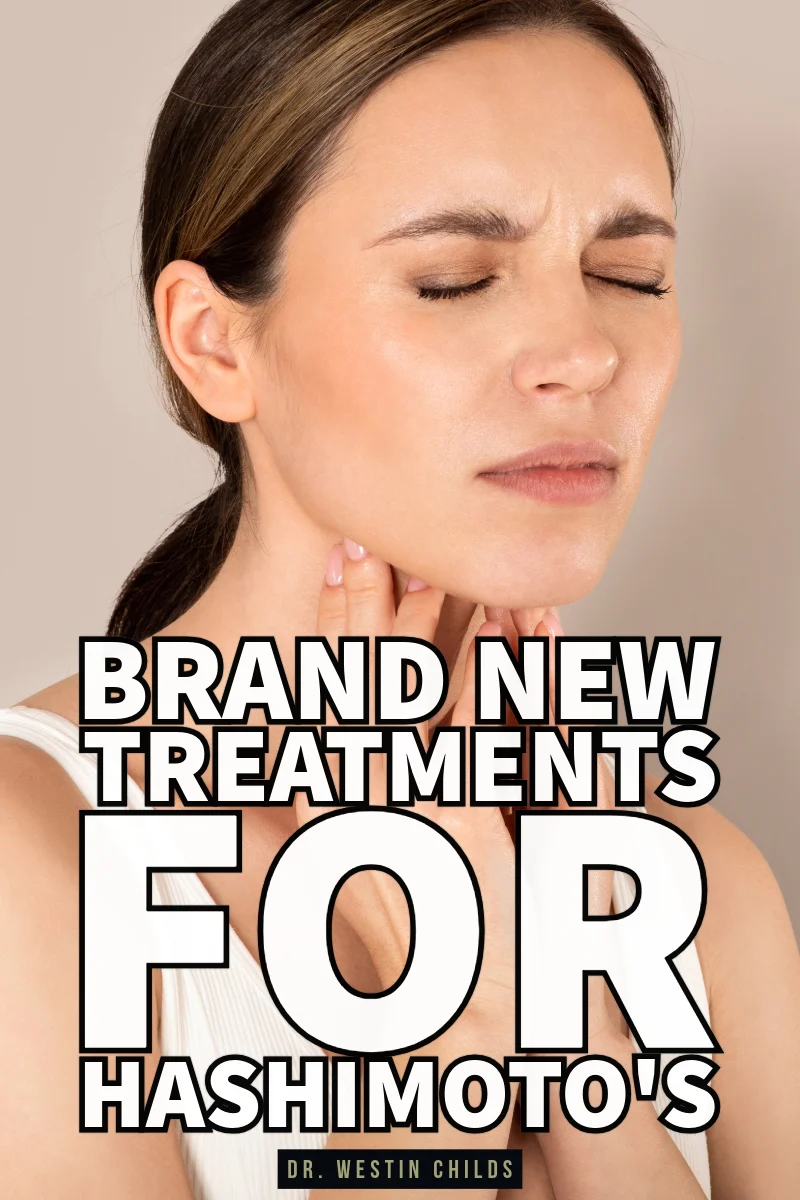
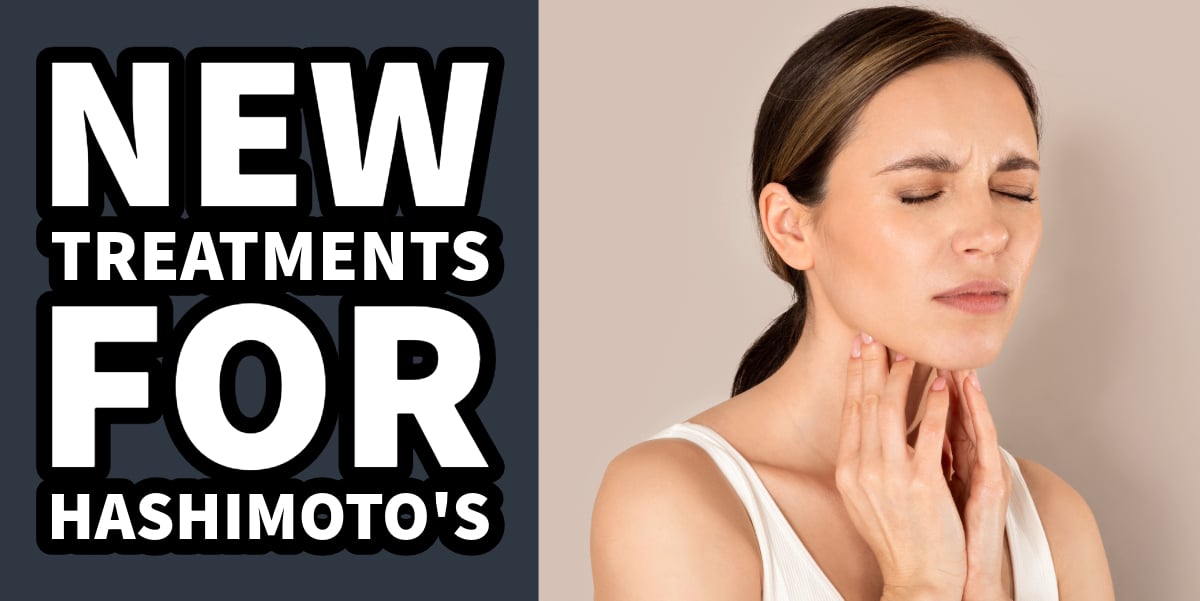

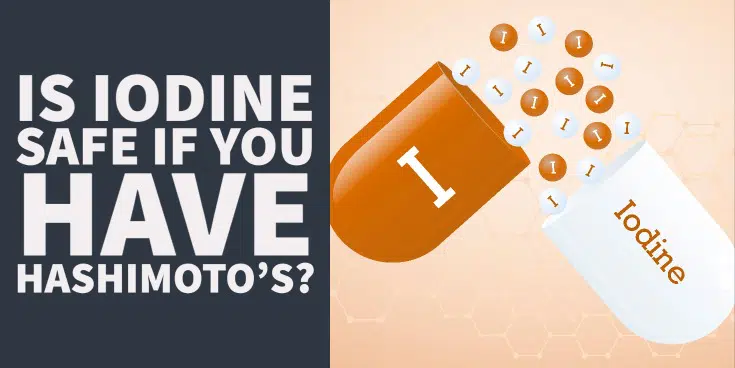
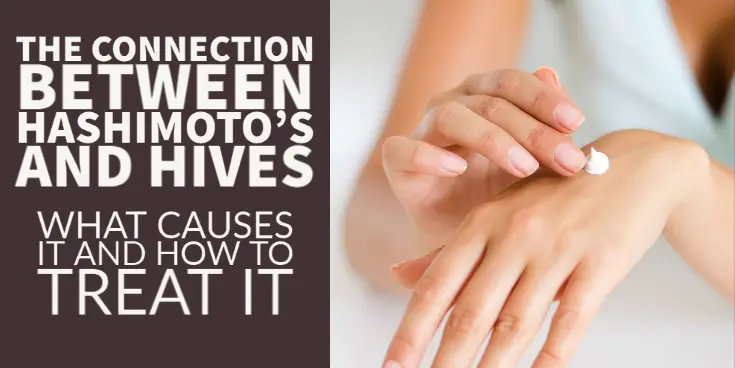
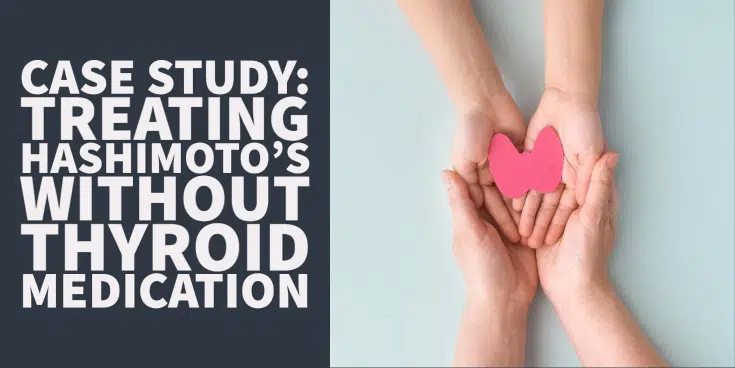
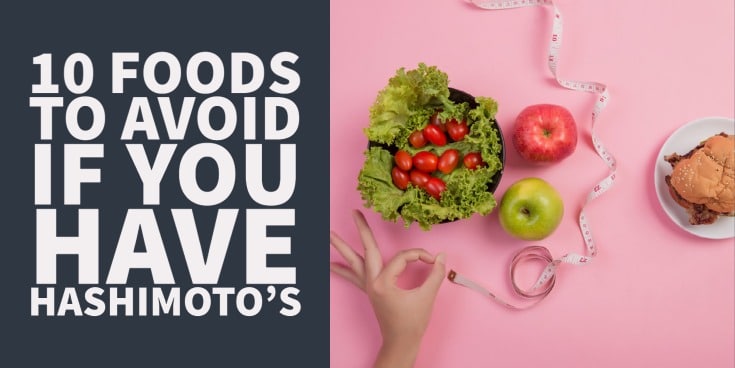
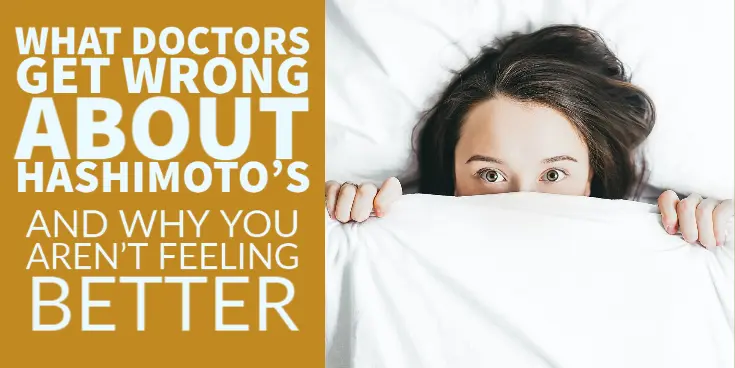
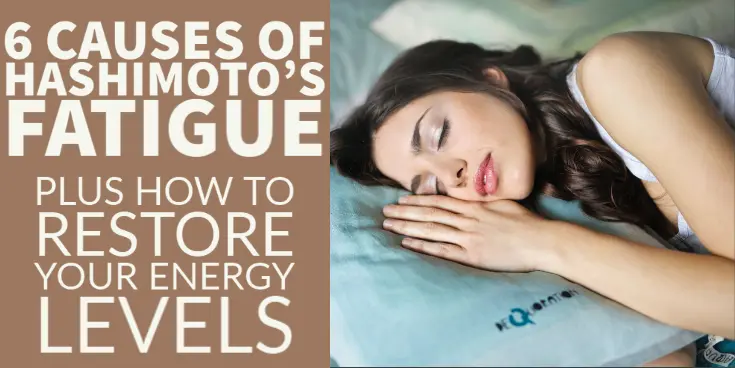

Hey doctor child’s.
I have a question in regards to weening off thyroid meds and your opinion. When I was diagnosed – I had a TSH of 7.82 with terrible symptoms. Starting on 25 mcg of t4 back in 2017 – I was still at 7.0 TSH and 1.1 ft4.
I’m now on 2 grains of NP thyroid transitioning off of Tirosint/cytomel 88/25 combo.
I felt too bloated and gained weight on Tirosint and cytomel.
Is it possible that I can get off this medication in the short/long term? Or being in thyroid meds for 7 years -give me no hope. No hashi antibodies.
My history is synthroid, Armour , then Tirosint/cytomel now back to np due to the bloating.
Thanks!
Hi Chris,
Yes, it’s possible. You can learn more here: https://www.restartmed.com/do-you-have-to-take-thyroid-medication-for-life/
It’s very difficult to predict who can get off thyroid medication, but there are some factors that can be predictive such as your TSH at the time of diagnosis, how much medication you require, etc. The article listed above references several of those and more are found here: https://www.restartmed.com/how-to-get-off-of-thyroid-medication/
Thank you. You are a GREAT resource for information. Obviously, you keep up with current literature.
Hi Mary Anne,
Glad to hear you found it helpful.
Thank you for all the info you provide. Binging on the content and trying to get a grasp of it all. I’ve just been prescribed NP Thyroid and due to start soon based on suboptimal though not off the chart labs (TSH 3.2, T4 1.23, T3 2.7, RT3 13.1, TPO Ab 25). My doctor feels my numbers warrant a trial treatment but does not think I have Hashimoto’s due to somewhat low TPO Ab. I’m unsure what to think as I’ve also heard the presence of Any Ab would signal Hashimotos. I feel my approach to my treatment would be different if clearly Hashi vs not. Would you recommend starting the Hashimoto’s Ab Rx drops at the same time, or wait to see where I stand after 6 weeks on NP Thyroid before adding the drops?
Hi Lucy,
My general advice is twofold:
1. Assume you have Hashimoto’s and treat acordingly, until proven otherwise. If you assume you have Hashimoto’s, you’d be right far more than you’d be wrong.
And 2. Treat as aggressively as possible as early as possible.
The reason is, even if you are wrong and you don’t have Hashimoto’s, you’ve done no harm. And, secondly, treating aggressively gives you the greatest opportunity to reverse your condition.
Some people try to dabble in thyroid treatments with one supplement here or there, but I don’t really see the benefit in that approach. You’re far better off just jumping in with both feet, and making big changes to do your best to reverse the condition as quickly as possible.
So in the absence of data proving you don’t have Hashimoto’s, I’d go full blown into the Hashimoto’s bundle with as many lifestyle changes as possible (diet, exercise, stress reduction, sleep improvement, etc.).
My husband needs help. He was misdiagnosed a while back and now has Hashimoto’s. He was put on Armour thyroid about 6 years ago but is in a crisis right now. A while before that he went to an endocrinologist who told him had no palpable thyroid and put him on levo. He did not feel good on that and went to another that put him on Armour. He is gaining weight, even though walking and working out daily. He was on the keto diet and didn’t lose much weight at all and is now packing back on. He is depressed, tired, foggy, unmotivated at this time even though he still walks and goes to the gym 4-5 days per week. He eats relatively clean but can’t lose weight. He went to an endocrine today and she basically told him levo or nothing. Please help. His labs look relatively normal, but something is going on? help!!!!!! any suggestions?
Hi Kathryn,
I would always first start with natural treatment options including lifestyle changes to see what kind of improvement you can get there. You can find everything you need for that here: https://www.restartmed.com/diet-low-carbohydrate-high-fat/
Do you know much about MSC stem cell treatment for Hashimoto’s? I am a male age 75 and have Hashimoto’s. I have been on 15mg of Amour Thyroid my TSH at its best was 2.6 over time my labs this year it’s up to 4.7. I have gone to two endocrinologist and I keep getting your labs are good you are depressed. Thanks
Hi Noel,
I do, but stem cell treatment is not likely to solve your issues. What you really need is a doctor that takes a more comprehensive look at your body and hormones. With a higher dose of thyroid medication, and probably some testosterone, most of your symptoms could likely be resolved.
Adthyza is no longer being manufactured. I was on it since last year and it worked great. Too bad it is no longer available.
Hi Christina,
This is the first I’ve heard of that, but it does look like their website has changed significantly since I last looked.
Dear Dr. Childs,
what are your thoughts on atrophic thyroid as the third type of thyroid autoimmune disease as a variant of Grave’s? My thyroid is hurting and continouslly decreasing (over 30 years now), at the moment it is 3,8 ml. I am told having Hashi without antibodies but I highly doubt this diagnose.
I (from Europe) was never positive for TRAb, TPOab or TGAb. I think TBAb is not available here. Thank you
Hi Marie,
Since I last looked at the research, atrophic thyroiditis was considered a late stage consequence of thyroid gland inflammation. I’m not sure I would consider it its own entity, but rather a stage of the disease as explained here: https://www.restartmed.com/stages-of-hashimotos/
Thank you. I would find myself then in endstage 5. But I never had any TRAb, TPOab or TGAb. Not now (even there is ongoing inflammation) and not 30, 20 or 10 years ago. That was also the reason why I did not get any attention at all. There is also research according to those AT is similiar to Grave and a total different thyroid issue then Hashimoto…But I did not came across any doctor who would know unfortunately.